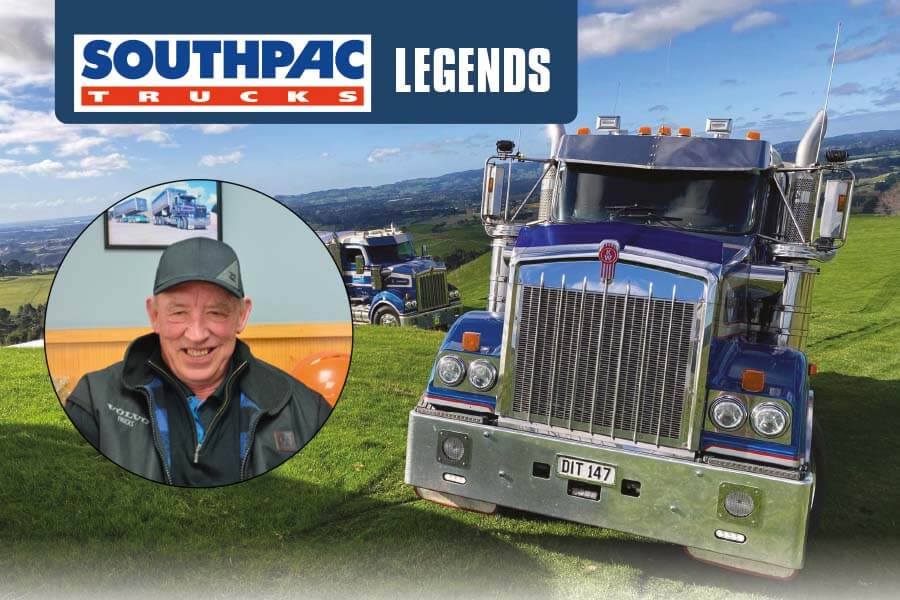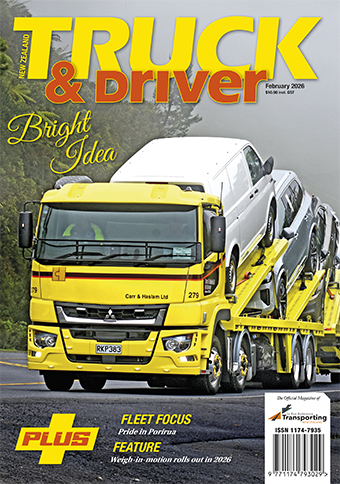Southpac Legends


Barry Stamp
Southpac Legends
Te Awamutu based operator Barry Stamp has been in the transport industry for around half a century. Over the time he has successfully been at the helm of a business that introduced scores of drivers (including his son Mitch) into the industry, and that’s why he’s a Southpac legend.
“I don’t really know what got me into it” was how Barry opened up our conversation, “I started driving trucks for something to do and have been doing it ever since.” Barry laughs.
Of course these are tongue in cheek statements but Barry Stamp has evidently come a long way from his first job, which was working on sheep stations in Gisborne.
Stamp says, “I quickly realized that I wouldn’t be owning a sheep station anytime soon, so I packed up and shifted to the Waikato.”
Barry started his trucking career in 1972 when he jumped behind the wheel for Dibble Brothers. Established by Eric and Colin Dibble, the business was essentially formed to make bulk hauling and spreading of fertiliser quicker and cheaper. Prior to 1953, fertiliser found its way onto farms via a cumbersome sequence of bags that were transported mainly from Auckland on rail and then transferred to drills that were towed behind tractors. The Dibble Brothers created a bulk spreader solution with specialist spreading trucks that they designed and built themselves and virtually changed the process overnight.
...Te Awamutu based operator Barry Stamp has been in the transport industry for around half a century. Over the time he has successfully been at the helm of a business that introduced scores of drivers (including his son Mitch) into the industry, and that’s why he’s a Southpac legend.
“I don’t really know what got me into it” was how Barry opened up our conversation, “I started driving trucks for something to do and have been doing it ever since.” Barry laughs.
Of course these are tongue in cheek statements but Barry Stamp has evidently come a long way from his first job, which was working on sheep stations in Gisborne.
Stamp says, “I quickly realized that I wouldn’t be owning a sheep station anytime soon, so I packed up and shifted to the Waikato.”
Barry started his trucking career in 1972 when he jumped behind the wheel for Dibble Brothers. Established by Eric and Colin Dibble, the business was essentially formed to make bulk hauling and spreading of fertiliser quicker and cheaper. Prior to 1953, fertiliser found its way onto farms via a cumbersome sequence of bags that were transported mainly from Auckland on rail and then transferred to drills that were towed behind tractors. The Dibble Brothers created a bulk spreader solution with specialist spreading trucks that they designed and built themselves and virtually changed the process overnight.
Stamp says, “I drove for them for maybe four or five years, spreading fert and lime all over the Waikato. I then had a break for a couple of years, where I went and had an overseas experience.”
I came back in 1980 and bought a 40ft semi-trailer and was carting containers out of Tauranga for 12 months, before selling and returning to Dibbles Bros in 1981 when the bulk trucks came up for sale. Dibble Brothers sold a truck with a licence to work around the area.
In 1981, Dibble Bros sold the spreading side of its business to concentrate on building a burnt lime plant.
Back then, the company was running a large fleet of vehicles and staff. Stamp says that he established a bond with some of the drivers who also brought a truck so they decided to form an alliance, Stamp was just twenty eight years old.
“And that’s when we started a small group called Dibble Independent Transport and I’ve pretty much been here ever since,” he says.
Dibble Independent Transport was a group of five drivers keen to make their mark. Barry Stamp, Derek Smith, the late Geoff Dibble, the late Alf Quaife and NZ Truck and Driver’s very own Trevor Woolston.
Stamp recalls, “We all came together and it worked quite well from the start but then over the years it slowly split up. Trevor started a magazine, Alf sold out to Roger Hurst, that sort of thing. And then it ended up just the three of us, Geoff, Derek and myself and that’s how Dibble Transport 97 started.”
According to Stamp, the three shareholders (Barry Stamp, Geoff Dibble and Derek Smith) bought out the other two shareholders in 1997, taking over both the business and the property (trucks and buildings) that had been acquired by the company over the years. And never really looked back.
It’s fair to say that Stamp is at heart a Mack man. His first truck was a 1977 R model Mack 285, which he then traded for a 350 R model Mack, both trucks really clocked up the miles.
“Then I went into a Superliner 500 before buying some fleet trucks, which was in the early 90s, when we started Dibble Transport.”
Upon reflection, Stamp reckons that he drove full time for about thirty years before moving into the office and says that he relished his time on the road.
“I used to enjoy it, especially driving some of that gear we had in the 90s, it didn’t take long to get around the place,” Barry laughs, and then adds “I think we got away with a lot more in the early days.”
But he believes that over the years the Industry has changed, and says that it’s not as ‘free’ as it used to be.
“It’s gone from being good fun driving to being a nightmare with all the compliance and shit that goes with it.”
But Barry concedes (albeit kind of reluctantly) that the changes have been necessary.
“What they’re doing, they have to do, there’s that much out there on the roads now, it had to be tightened up.”
Stamp may very well look back at those earlier days with a huge sense of nostalgia but he isn’t exactly unhappy with the way things are on the whole nowadays either.
“It’s all good when everything is going good and the good days outweigh the bad days. I don’t really miss being behind the wheel, mostly because of the traffic.”
He says that the industry has been kind to him (overall) and that there are a lot of good people in transport saying that he’s made a lot of friends along the way, but adds that watching his son Mitchell come through has been a highlight.
“I grew up sleeping on the floor of R Models and Superliners” Mitchell jokes. “I spent many a school holiday out on the road with Barry.”
Mitchell and wife Gina went on to purchase Dibble Transport 1997 Ltd in 2013 meaning that Barry could move onto owning and running a fleet of cement tankers called Dibble Bulk Transport, operating out of the Mount. He reckons that it’s an easier job than bulk with really just one client, but that doesn’t mean that it’s quiet.
Barry says, “I did seven years on the phone with the tankers, handling many calls a day. And was organising the trucks at the Mount from here in Te Awamutu.”
But he says that he’s actually quite lucky at the moment as he’s got a transport manager who has been doing his job for him now, so it makes life a lot easier.
“I don’t have the phone now, the tanker side of the business is organised from the Mount.”
Right now, Stamp has around fifteen drivers on the tanker fleet and Mitch runs more in Te Awamutu, creating jobs and keeping drivers in work is something that Stamp says he’s proud of.
“I’ve introduced a lot of fresh drivers into the industry, and given a lot of people jobs.”
It’s a loyal team too, with some staff surpassing the multiple decade milestones. While Stamp is still predominantly a ‘Mack’ man, he says that some of his new drivers have been specific as to what trucks they would like to drive. Stamp says that the landscape is changing and Kenworths are slipping into the fleet.
“It’s another way that the industry is changing and we have had to adapt to keep the drivers happy.”
It could be said that Stamp technically finished up about 2015 and although he’s relinquished his day to day duties (and his phone), he remains part of the furniture.
“I’m on the last lap,” he jokes. “Nowadays I just come in and see what’s going on. I’ve got a lifestyle block that I potter around on, which keeps me quite busy.”
He says that he’s also a keen fisherman, and spends time fishing up at the Hauraki Gulf whenever possible.
Stamp believes that right now he’s ‘got the recipe right’ he says “if it’s a nice day I like working around home but if it’s a shitty cold day I’ll come in here, drink coffee where it’s warm.”
Plenty of free time to go fishing and yet chooses to go to work? This makes us think Barry is still very passionate about the transport industry.



 + EQUIPMENT GUIDE - FREE
+ EQUIPMENT GUIDE - FREE
